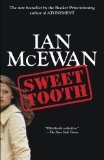Summary | Excerpt | Reading Guide | Reviews | Beyond the Book | Readalikes | Genres & Themes | Author Bio

A Novel
by Ian McEwan
One dark late afternoon in December, three days before the end of term, he is mugged in the street. Monica has asked him to go to the bank at lunchtime to draw out seventy pounds from the joint account so that she can buy presents and Christmas treats. It is almost all they have by way of savings. He has turned into his own road, which is narrow and poorly lit, and is a hundred yards from his front door when he hears steps behind him and feels a tap on his shoulder. He turns and standing before him was a kid of sixteen or so, West Indian, holding a kitchen knife, a big one with a serrated blade. For a few seconds the two stood close, less than three feet apart, staring at each other in silence. What troubles Sebastian is the boy's agitation, the way the knife trembles in his hands, the terror in his face. Things could easily get out of control. In a quiet shaky voice the boy asks for his wallet. Sebastian raises his hand slowly to the inside pocket of his coat. He is about to give away his children's Christmas. He knows he is stronger than the kid and he calculates that as he holds out his wallet he could strike out, hit him hard on the nose and snatch the knife off him.
But it is more than the kid's agitation that restrains Sebastian. There was a general view, strongly held in the staff room, that crime, especially burglary and mugging, was caused by social injustice. Robbers are poor, they've never had the right chances in life and can hardly be blamed for taking what isn't theirs. This is Sebastian's view too, though he's never given the matter much thought. In fact, it isn't even a view, it's a general atmosphere of tolerance that surrounds decent educated people. Those who complain about crime are likely to complain also about graffiti and litter in the streets and hold a whole set of distasteful views on immigration and the unions, tax, war and hanging. It was important therefore, for the sake of one's self-respect, not to mind too much about being mugged.
So he hands over his wallet and the thief runs away. Instead of going straight home Sebastian walks back toward the High Street and goes to the police station to report the incident. As he speaks to the desk sergeant, he feels a bit of a cad or a snitch, for the police are clearly agents of the system that forces people to steal. His discomfort increases in the face of the sergeant's grave concern, and the way he keeps asking about the knife, the length of the blade, and whether Sebastian was able to see anything of the handle. Of course, armed robbery is a very serious offense. That kid could go to jail for years. Even when the sergeant tells him that there was a fatal stabbing only the month before of an old lady who tried to hang on to her purse, Sebastian's unease is not dispelled. He shouldn't have mentioned the knife. As he walks back along the street, he regrets his automatic impulse to report the matter. He's becoming middle-aged and bourgeois. He should have taken responsibility for himself. He is no longer the sort of guy who puts his life on the line and climbs up sheer faces of granite, trusting his agility, strength and skill.
Because he is beginning to feel weakness and trembling in his legs he goes into a pub and with the loose change in his pocket is just about able to afford a large scotch. He downs it in one, and then he goes home.
The mugging marks a decline in his marriage. Though Monica never says so, it is clear she doesn't believe him. It's the old story. He's come home stinking of drink, protesting that someone has run off with the holiday money. The Christmas is wretched. They have to borrow from her haughty brother. Her distrust kindles his resentment, they are distant with each other, they have to pretend to be jolly on Christmas Day for the sake of their children, and that seems to heighten the bleakness that comes down to trap them into silence. The idea that she thought he was a liar was like a poison in his heart. He works hard, he is loyal and faithful and keeps no secrets from her. How dare she doubt him! One evening when Naomi and Jake are in bed, he challenges her to tell him that she believes him about the mugging. She is immediately angry, and won't say whether she does or not. Instead, she changes the subject, a trick in argument, he thinks bitterly, she is supremely good at and one he should learn himself. She is sick of her life, she tells him, sick of being financially dependent on him, of being stuck at home all day while he is out advancing his career. Why have they never considered the possibility of him doing the housework and looking after the children while she resumes her career?
Excerpted from Sweet Tooth by Ian McEwan. Copyright © 2012 by Ian McEwan. Excerpted by permission of Nan A. Talese. All rights reserved. No part of this excerpt may be reproduced or reprinted without permission in writing from the publisher.
Your guide toexceptional books
BookBrowse seeks out and recommends the best in contemporary fiction and nonfiction—books that not only engage and entertain but also deepen our understanding of ourselves and the world around us.